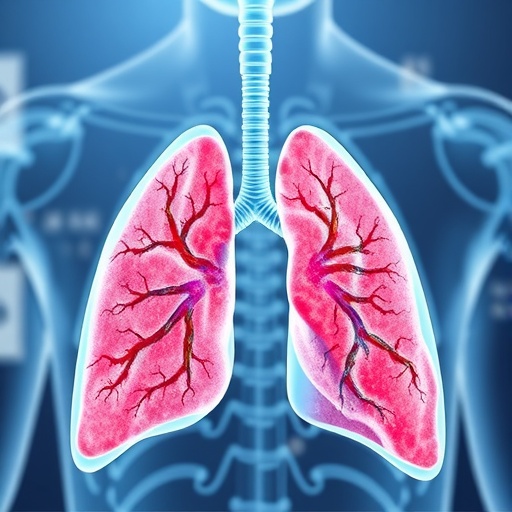In the field of transplant medicine, the challenges surrounding lung transplants, particularly in patients with panel reactive antibody (PRA) positivity, have compelled researchers to seek innovative solutions. A pivotal study by Chang et al. shines a light on the outcomes of venovenous-extracorporeal membrane oxygenation (VV-ECMO) as a bridging strategy for these patients. The article, published in the journal Artificial Organs, explores how this approach may enhance the chances of successful transplantation and overall patient survival in this complex demographic.
VV-ECMO represents a sophisticated form of life support that temporarily takes over the function of the lungs in patients who experience severe respiratory failure. By oxygenating the blood outside of the body, VV-ECMO allows for critical time to elapse while addressing underlying lung pathology or preparing for transplant. In this context, the study investigates its effectiveness and safety, particularly in highly sensitized lung transplant candidates—those with elevated PRA levels that indicate a high level of antibodies against donor organs.
The demographic of patients with PRA positivity represents a unique challenge in lung transplantation. These patients often demonstrate an increased risk of acute rejection and poorer post-operative outcomes. By utilizing VV-ECMO as a bridging modality, clinicians hope to stabilize these patients while simultaneously mitigating the immune response before the transplant. This study’s insights contribute significantly to evolving strategies for managing high-risk transplant recipients, creating a pathway for enhanced survival and recovery.
Findings from the study highlighted the impressive potential of VV-ECMO. The research involved a comprehensive analysis of clinical data from lung transplant recipients who were bridged with this technology. Outcomes such as transplant success rates, post-operative complications, and survival were meticulously evaluated, revealing promising improvements in patients who had exhausted other treatment options. This illustrates the pivotal role of such advanced technologies in modern transplant medicine, where conventional approaches may not suffice.
Moreover, the use of VV-ECMO does not come without risks. Patients are often subjected to complex anticoagulation protocols to prevent thrombosis in the ECMO circuit, and they may face complications such as bleeding, infection, and mechanical device failures. The study acknowledges these challenges while also reinforcing that, in the specific population studied, the benefits outweighed the potential downsides. This crucial balance allows for a better understanding of patient selection and management in the intensive care setting, where VV-ECMO continues to evolve.
Understanding the immune mechanisms at play is equally important in this context. The presence of high PRA levels indicates that the recipient’s immune system is prepared to recognize and attack foreign tissues, complicating transplantation efforts. Researchers are motivated to understand the intricacies of these immune responses better, and longer-term data on patients transplanted after VV-ECMO support are needed. Ongoing studies will determine whether this approach can mitigate immune-mediated complications often faced by sensitized patients.
Furthermore, the outcomes of bridging patients with advanced technologies like VV-ECMO may reshape the broader narrative about lung transplantation. Traditionally, patients with high PRA levels faced a significantly lower likelihood of being offered transplant opportunities. The success of bridging strategies may encourage transplant centers to adopt more flexible criteria for transplant eligibility, thereby potentially increasing the donor pool’s utilization.
The implications of Chang et al.’s findings extend beyond immediate clinical outcomes. The study also prompts reconsideration of resource allocation within healthcare systems. With a growing number of patients experiencing acute respiratory distress and requiring complex interventions, understanding which patients benefit most from bridging strategies can significantly affect healthcare planning and policy decisions.
As the field of transplant medicine continues to advance, the integration of multidisciplinary approaches is increasingly essential. VV-ECMO bridges the gap between critical care and surgical intervention, establishing a common ground for anesthesiologists, intensivists, and transplant surgeons. Collaborative care models that promote communication and shared decision-making amongst these specialties are vital for optimizing outcomes, especially in the context of complex patient populations.
This research highlights the critical importance of personalized medicine. Tailoring treatment protocols to specific patient needs, including those with PRA positivity, could lead to significant improvements in individual outcomes. As further research emerges, it may become possible to establish a standardized protocol for utilizing VV-ECMO in lung transplantation, paving the way for more successful practices based on clinical evidence.
Overall, the evidence presented by the team led by Chang emphasizes that the advent of advanced therapeutic strategies like VV-ECMO can potentially unlock new opportunities for patients considered to be at the intersection of innovation and desperation. It underscores an important message: that even among the most challenging cases, progress can be made through systematic research and clinical determination.
In conclusion, the study’s findings advocate a changing landscape for lung transplantation, particularly for patients grappling with sensitization issues. By harnessing the power of innovative technologies and integrating them into a comprehensive care model, the field can foster a future where even the most vulnerable patients can find renewed hope for optimal health outcomes after lung transplantation.
Subject of Research: The outcomes of venovenous-extracorporeal membrane oxygenation (VV-ECMO) in lung transplant recipients with panel reactive antibody positivity.
Article Title: Outcomes of venovenous-extracorporeal membrane oxygenation bridging in lung transplant recipients with panel reactive antibody positivity.
Article References:
Chang, A., Miyashita, Y., Thomae, B.L. et al. Outcomes of venovenous-extracorporeal membrane oxygenation bridging in lung transplant recipients with panel reactive antibody positivity.
J Artif Organs 29, 2 (2026). https://doi.org/10.1007/s10047-025-01539-2
Image Credits: AI Generated
DOI: https://doi.org/10.1007/s10047-025-01539-2
Keywords: Venovenous-extracorporeal membrane oxygenation, lung transplantation, panel reactive antibody positivity, respiratory failure, transplant outcomes.




